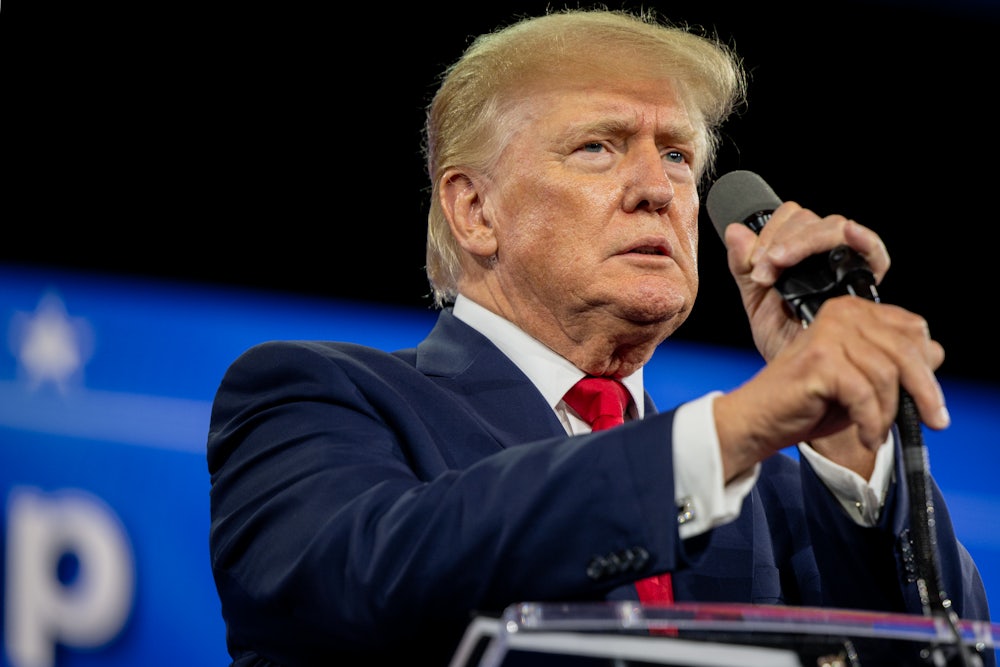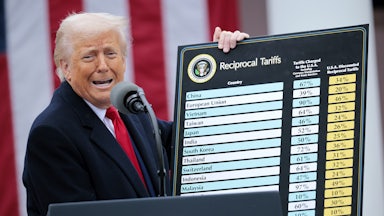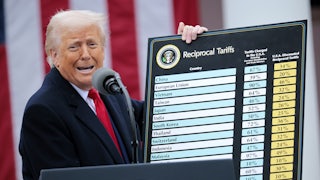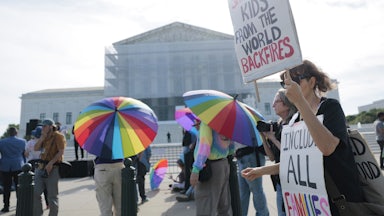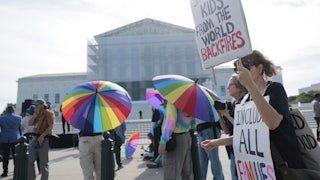Under normal circumstances, I would probably not write about former President Donald Trump’s defamation lawsuit against CNN. The 29-page complaint, which was filed earlier this week in a federal court in Florida, claims that the network and its commentators defamed Trump by, among other things, implicitly and explicitly comparing him to Adolf Hitler. He is seeking $475 million in damages from the network for the purported impact on his reputation and his political career.
Defamation lawsuits in the United States are usually not worth covering. I rarely write about them because they rarely succeed and they rarely affect anyone other than the parties involved. There are notable exceptions, such as the ongoing Dominion Voting Systems lawsuits against a wide array of election-fraud mythologists after the 2020 election, or the 2013 Hulk Hogan lawsuit that led to the shuttering of Gawker in 2016. But such precedent-setting examples are few and far between.
That threshold is even higher, at least for me, where Trump is concerned. He has a long history of filing superficial and legally deficient lawsuits. Trump sued Hillary Clinton and the Democratic National Committee this summer over the 2016 election, for example, only to see that lawsuit thrown out in July. All other things being equal, his lawsuit against CNN should, theoretically, meet the same fate.
But all things do not appear to be equal where this lawsuit is concerned. The complaint sketches out a vision of the First Amendment, political speech, and defamation liability that would have serious consequences for free speech if adopted by the courts. We know from recent experience with Judge Aileen Cannon’s handling of the Mar-a-Lago case that Trump has a habit of trying to engineer cases to appear before judges he may think are more favorable toward him—and he appears to have done it again this time.
The factual basis of the lawsuit is fairly simple. Trump offers multiple examples in which CNN, through either its commentators or its reporting, drew comparisons between Trump and Hitler. Host Fareed Zakaria juxtaposed Trump’s comments with black-and-white footage of the Nazi dictator in a 2022 documentary titled “The Fight to Save American Democracy.” A CNN guest in 2019 argued that Trump “is as destructive a person in this century as Hitler, Stalin, and Mao were in the last century.” Anderson Cooper once interviewed singer Linda Ronstadt about her views on the parallels between 1930s Germany and Trump-era America.
“When labels like ‘racist,’ ‘Russian lackey,’ and ‘insurrectionist’ did not have the desired effect to undermine [Trump’s] candidacy when running for President or [Trump’s] accomplishments as President, CNN upped the stakes to conjure associations between [Trump] and arguably the most heinous figure in modern history,” his lawyers argued in the complaint. “CNN’s persistent use of ever-increasing defamatory characterizations of [Trump] up to and including comparing him to Hitler and Nazism demonstrates that it published its defamatory statements about [Trump] with actual malice.”
There are a few problems with Trump’s view of defamation. For one, courts have historically distinguished between fact and opinion when deciding whether something meets the legal threshold of defamation. The statement “John Doe is creepy” would be almost certainly seen by the courts as an opinion that is protected by the First Amendment. The statement “John Doe is a child molester,” on the other hand, would likely be seen as potentially defamatory. It asserts that John Doe molested a child, which is a provable or disprovable fact. (Please do not use my hypothetical examples as a guide for when and how you can defame someone.)
Comparing someone to a Nazi might be the most celebrated example of a hyperbolic opinion, which is usually protected by the First Amendment under existing precedents. Holding otherwise would open up tens of millions of Americans to potential defamation lawsuits. Whatever you think of the accuracy or propriety of comparing anyone to Hitler, it’s fairly incontrovertible that it happens often across the political spectrum. Former President Barack Obama was likened to Hitler by conservative figures ranging from country singer Hank Williams Jr. to former Fox News host Glenn Beck. (Beck, for his part, also made similar comments about billionaire George Soros, who is Jewish, and former Vice President Al Gore.)
The lawsuit also takes aim at CNN’s use of the phrase “the Big Lie” as a term of art to describe Trump’s false claims that he was the legitimate winner of the 2020 election. (Or, as Trump puts it, his “stated concerns about the integrity of the election process for the 2020 presidential election.”) Trump notably does not challenge CNN’s use of the phrase “Big Lie” here on factual grounds—that is to say, he does not assert that what CNN described as the “Big Lie” is actually true. He instead says it was unfair for CNN to use a phrase that implicitly compared him to Hitler and the Nazis.
“The ‘Big Lie’ was used by Hitler to incite hatred of the Jews and to convince people to ostracize Jewish people,” Trump’s lawyers said in the complaint. “It was an entire propaganda campaign to justify Jewish persecution and genocide. The phrase is not taken lightly and is not bandied about blithely. CNN anchors and commentators understand this. They have not used it against other political leaders and previously criticized political analogies to Nazi Germany and to Hitler.”
Trump’s sense that defamation claims can be brought if he thinks someone is mean to him or unfair to him is best expressed when he discusses actual malice. The Supreme Court held in the landmark 1964 case New York Times v. Sullivan that the First Amendment generally forbids defamation claims unless a plaintiff can show that the statement in question was made with “actual malice.” It is not enough for a defamatory statement simply to be false; it must also have been made with “reckless disregard” for the truth. American courts have generally held this to be a high threshold for defamation litigants to overcome, especially against public figures.
Trump tries to have it both ways on actual malice. The former president does not explicitly call for Sullivan to be overturned, as Justice Clarence Thomas suggested in 2020 and as Trump has proposed elsewhere. He instead argues simultaneously that he has both met Sullivan’s high burden but that it shouldn’t apply to him. He quoted a dissent by the recently deceased Judge Lawrence Silberman, who opined that the actual-malice standard should not apply if there is “ideological homogeneity in the media,” whatever that means. And he suggested that as he is a public figure, the actual malice standard should be lower than usual, not higher.
“While the allegations in this complaint meet the actual malice standard set forth in New York Times Co. v. Sullivan, that standard does not—and should not—apply where the media defendant is not publishing statements to foster debate, critical thinking, or the ‘unfettered interchange of ideas’ but rather seeks to participate in the political arena by offering propaganda,” Trump’s lawyers argued. “The irresponsible use of false, misleading, and inflammatory language in an effort to destroy a political opponent’s reputation cannot be categorized as an intellectual exchange of ideas.”
This appears to be at odds not only with Sullivan but also with the Supreme Court’s prevailing thinking on the First Amendment in general. The high court does treat different forms of speech in different ways when it comes to First Amendment protections. But political speech—speech about policies, elections, candidates, and so on—is typically given the highest levels of protection by the court. Trump inverts that formula by arguing that whatever he describes as “propaganda” about “political opponents” should receive lessened First Amendment protections. It also goes without saying that Trump himself might face some problems if “false, misleading, and inflammatory language” against political opponents is suddenly fair game for defamation claims.
So why pay any attention to a defamation case that is at such odds with the prevailing legal standards? In recent months, Trump has shown an aptitude for getting outlandish legal theories to be heard by friendly judges whom he himself appointed. Judge Aileen Cannon’s troubling handling of his Mar-a-Lago lawsuit, which I’ve described in greater detail in previous articles, shows how Trump can use judicial forum-shopping to achieve more favorable results for himself sometimes, at least in the short run. The former president happened to file that lawsuit in the Southern District of Florida’s Fort Pierce Division, where Cannon is the only active judge.
Trump again filed his defamation lawsuit against CNN earlier this week in the Southern District of Florida, but this time chose the Fort Lauderdale Division. Four of the five nonsenior judges assigned to that division are Trump appointees. One of them, Judge Raag Singhal, was ultimately assigned the case. The case law should be familiar for Singhal since he happens to be overseeing another defamation case against CNN at the moment. That one was brought by retired Harvard University law professor Alan Dershowitz over the network’s coverage of his comments during Trump’s first impeachment trial.
Dershowitz won an early victory of sorts in May when Singhal rejected CNN’s motion to dismiss the lawsuit. The judge rejected the network’s claim of fair-report privilege by noting that it had left out a crucial part of Dershowitz’s answer about the legality of Trump’s impeachment and thus did not present his argument fairly. He also rejected CNN’s claim that its commentators were expressing an opinion instead of a fact, citing precedents that did not extend the protections for opinions to mixtures of opinion and fact.
Most importantly, however, Singhal also found that Dershowitz had overcome the actual-malice hurdle, at least at this stage of the case. “These allegations, for purposes of surviving the Motion to Dismiss, plausibly plead a factual basis from which ‘actual malice’ can be inferred,” he wrote. “The Complaint alleges that CNN knew its reports were false, it explains the reasons CNN and its employees knew the reports were false, it explains the nature of the alleged falsehoods, and it alleges who made the false statements.” It’s worth noting that this does not mean that Dershowitz will ultimately prevail. Judges typically view the available facts in the most favorable light possible towards a plaintiff when considering a motion to dismiss, and that lens will not help Dershowitz in the later stages of the case. But it is still a hurdle that many other defamation claims fail to overcome.
It’s worth noting that Singhal did not give Dershowitz everything he wanted: He notably struck a portion of the complaint that claimed “political malevolence” on CNN’s part. As I noted before, Trump’s defamation case is substantially weaker than Dershowitz’s, so Singhal’s ruling in favor of the latter does not necessarily mean he will rule in favor of the former. Singhal also does not appear to have taken any extraordinary liberties with defamation law to reach his decision, as Cannon did in the Mar-a-Lago case. CNN notably did not appeal his ruling against it to the Eleventh Circuit Court of Appeals.
The problem is that Trump appears to have engineered a defamation lawsuit against a perceived opponent to appear before a group of judges that he himself largely appointed. One of those judges had already ruled against the defendant in a defamation case brought by one of Trump’s political allies, and Trump may well have thought that this would give him a leg up in his own case. This does not mean that Singhal will take the same reckless approach as Cannon when he hears Trump’s case, of course. But it does mean that it can’t be ignored out of hand, either.
